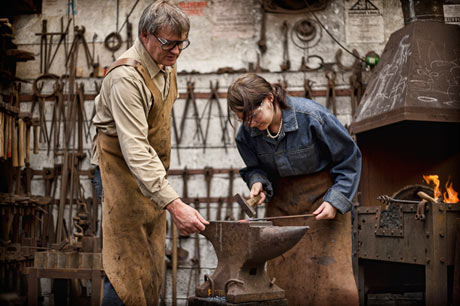
Smith, one of Britain's most popular surnames, means metal worker, and there was a time when every village in the land had its own resident blacksmith. Not any more. Nowadays there are only 600 registered. "We're almost extinct," says Aaron Petersen, the blacksmith I have come to train with today.
Aaron's forge, just past St Clears in Carmarthenshire and tucked up a long, curling track, is, on first impressions, the ultimate Dad's Shed. There's a smell of coal and kerosene in the air. At the far end, the forge is glowing red and is surrounded by anvils – there are two kinds: the London anvil, which has a pointed bick like a beak; and the Breton anvil which looks more like a sharp pig snout. On the walls hang every kind of hammer, tong and spanner you could ever imagine, while around us sit heavy pieces of equipment that I probably shouldn't even look at let alone have a go on. Old oil cans of every shape and size dot a high ledge, and on the far wall, just above the forge, there are a dozen old posters. "Those are from the early 80s," Aaron tells me. "I went on a Welsh blacksmith tour with my dad. We went all over the world."
Aaron's background is in fine art, but his father was a sculptor and it was he who ignited Aaron's passion for blacksmithing. After a six-year stint as the resident blacksmith at the Welsh open-air museum at St Fagans, Aaron decided to set up on his own and pass on his knowledge to anyone who wants to learn.
I've come to do a short morning course. I have no experience in metal work and my upper body strength is woeful. I've been warned this is going to be physical and I'm worried I'm not going to be able to do it.
The first thing I get to do is stoke the forge, and as I poke it about a bit Aaron turns up the air valve and the small golden orb that sits sunken amid the black roars upwards. "In the old days," Aaron tells me, "the forge would be aired with bellows. They'd get small boys to operate them. Or dogs in wheels."
"Did you always want to be a blacksmith?" I ask him, as he saws off a length of iron for me to stick into the fire.
"No," he answers. "I used to be in a punk jazz band. We were called Acme Jazz. I played the bass. Basically I played the same five notes for two years."
Aaron decides to start me off with something small but concentrated. I'm going to try and make a hammer-in hook. The first thing I need to do is square off the round length of iron I've been given to work with. I've thrust it into the forge and when I pull it out, seconds later, the end is glowing white and fizzing.
"Shake it down towards the ground," Aaron tells me, and as I do, sparks of liquid iron scatter across the floor. It's brilliant.
"Ooooh," I say, grinning. And then I stick my rod back into the forge so I can do the fizzy thing again. And again. And then again.
"That's probably enough times," says Aaron, patiently.
The work is hard but not impossible. Once I've got the hang of turning the rod and using the hammer quickly while the iron is hot, it's pretty straightforward and, using the bick, Aaron shows me how to curl the tip. Mine lacks sophistication but there's no doubt about it, I've made a hook. I'm bloody delighted.
"Right," says Aaron. "Now you're going to make something bigger."
He cuts a thicker length of iron. I'm going to attempt a twisting poker. The hardest bit is making the rounded top end. This requires strength and precision, but even though I make mistakes, the fact I can stick my iron back into the fire and then rectify everything I get wrong is nothing short of wondrous. Somehow, an hour later, I have managed to make a working decorative poker that I could actually give to my dad for Christmas. I have never felt a greater sense of achievement.
As Aaron passes me my now polished poker I am triumphant. "I have made things from only fire and iron. I feel like a GOD!" I declare.
• Aaron Petersen runs one-day blacksmith courses for £130pp and two-day courses for £260pp. The next two-day courses are scheduled for 24, 25 February, 17, 18 March, 30, 31 March, 28, 29 April, 18, 19 May and 15, 16 June. For more information, call 01267 223932 or visit ferricfusion.co.uk. Emma stayed at Teifi Cottage in Trapp (01874 676446, breconcottages.com), which sleeps four, from £335 per week. For further information, see discovercarmarthenshire.com

